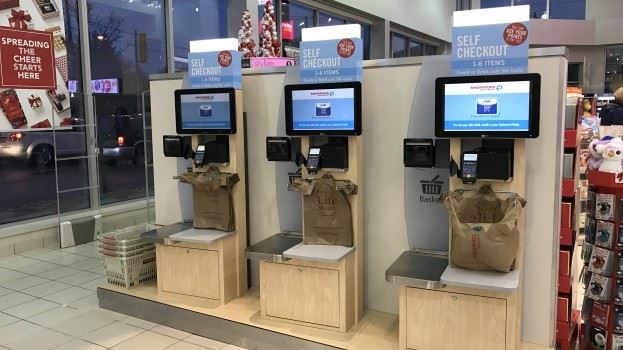Self checkouts are killing our economy! Or are they? Mechanical automation has been around for a long time, this is the automated assembly line, they are featured in almost every movie or TV show about “The Working Man”. Basically, someone stands by a line of moving parts and checks to make sure the machines are correctly assembling them. What once took 300 people, now takes 5, sounds like a ton of jobs were lost, right? Well, lets take a look at that.
When it takes 300 people to make something, you have to pay 300 people, which means you have to charge for the wages of 300 people, which means things are more expensive. It also means you can't pay each individual as much for that job, so you wind up with 300 minimum wage (or near minimum wage) employees. What I find most interesting about the people who argue against automation is that they will demand it costs jobs, but in the same breath demand those jobs don't pay enough. Well, if we chip away as many jobs as we can with automated machines, we give room to pay the employees that remain more money. So, in the 80's, mechanical automation was instituted, which created room for technical salaries, quality control salaries, marketing salaries, executive salaries, etc, all of which pay drastically more than the average assembly worker in the previous manufacturing model. So, assets were rearranged to turn horrible factory jobs into professional careers, careers like machine maintenance, technical foreman and plant coordinator, careers that could support a family comfortably without having to work 70 hours a week.
But what about the other 295 people who weren't included in the new careers? Well, I have no idea, but I know that they weren't out of a job. At the height of the switch to mechanical automation in the 1980's until it was inevitably accepted in the early 1990's, unemployment was halved (according to statistics Canada). So, what happened to them? They got other jobs, they started their own supporting businesses fixing the things they used to build, they changed their vocations and went back to school. They got on with their lives. Automation eliminates a bunch of really terrible jobs and replaces them with a few really great jobs, that's basically how it works.
We live in a poverty stricken community, I know it's not exactly considered polite to say it out loud, but poverty has become a huge problem in Cape Breton. We consider the minimum wage market to be the last market remaining in Cape Breton, and we are very protective of it. But should we be? The numbers and history tells us that with automation comes increases in average salaries and higher quality of life, so is it really something we should be fighting against? With self-checkouts we will lose three minimum wage cashier jobs, but we will gain one 50k a year maintenance job that will support a young family.
There will always be jobs for young people and teenagers, and they will always be terrible. There is always some awful job that some business owner or manager will be willing to pay a young person minimum wage to do. That isn't an excuse to try to force businesses to continue paying wages to employees for a job that could be done faster and cheaper by a machine. The argument of lack of low wage jobs for immigrants had been mentioned in the same breath in the last article I read on this topic, which also doesn't hold water for me. That argument isn't one in favor of keeping cashier jobs, it's an argument in favor of decreasing immigration as far as I can tell. If we don't have the economic resources to support the people we are immigrating, then we shouldn't be immigrating them.
In the end, self-checkouts and digital automation are here to stay, they are happening and we need to learn to live with it. I doubt it will have a negative impact on our local economy, or at least it is the least of our worries in regards to that, and it's more likely to create a few high paying careers that will allow sub-markets to grow and flourish. At least that's what history tells us anyway.
Self Checkouts: They aren't the monster you think they are.
Posted by
Brian Linden
Receive news by email and share your news and events for free on goCapeBreton.com
SHOW ME HOW
https://capebreton.lokol.me/they-arent-the-monster-you-think-they-are
Self Checkout's and automation in general will probably help us more than hurt us, so you shouldn't hate them for the sake of hating them.
Business Doing business in Cape Breton
View all the LATEST
and HOTTEST posts
and HOTTEST posts






25
Log In or Sign Up to add a comment.- 1
arrow-eseek-e1 - 5 of 5 itemsFacebook Comments